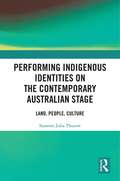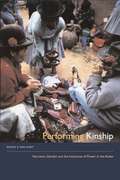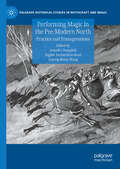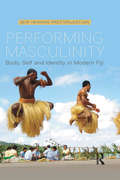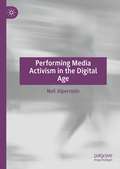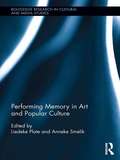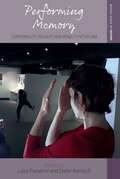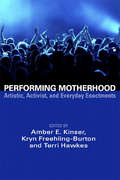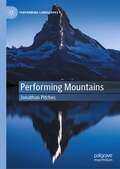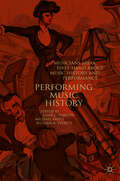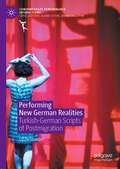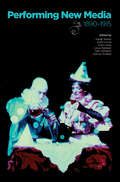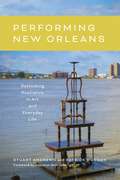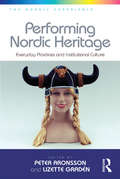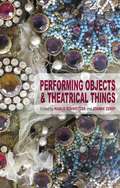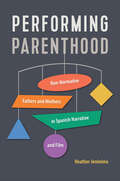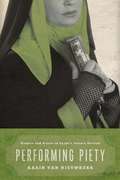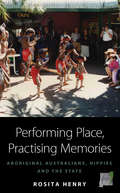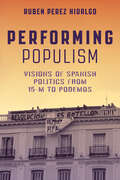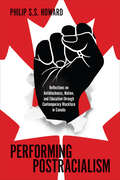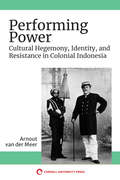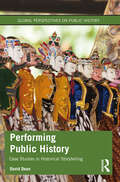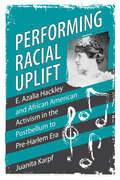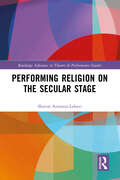- Table View
- List View
Performing Indigenous Identities on the Contemporary Australian Stage: Land, People, Culture
by Susanne Julia ThurowOver the past 50 years, Indigenous Australian theatre practice has emerged as a dynamic site for the discursive reflection of culture and tradition as well as colonial legacies, leveraging the power of storytelling to create and advocate contemporary fluid conceptions of Indigeneity. Performing Indigenous Identities on the Contemporary Australian Stage offers a window into the history and diversity of this vigorous practice. It introduces the reader to cornerstones of Indigenous Australian cultural frameworks and on this backdrop discusses a wealth of plays in light of their responses to contemporary Australian identity politics. The in-depth readings of two landmark theatre productions, Scott Rankin’s Namatjira (2010) and Wesley Enoch & Anita Heiss’ I Am Eora (2012), trace the artists’ engagement with questions of community consolidation and national reconciliation, carefully considering the implications of their propositions for identity work arising from the translation of traditional ontologies into contemporary orientations. The analyses of the dramatic texts are incrementally enriched by a dense reflection of the production and reception contexts of the plays, providing an expanded framework for the critical consideration of contemporary postcolonial theatre practice that allows for a well-founded appreciation of the strengths yet also pointing to the limitations of current representative approaches on the Australian mainstage. This study will be of great interest to students and scholars of Postcolonial, Literary, Performance and Theatre Studies.
Performing Jane: A Cultural History of Jane Austen Fandom
by Sarah GlossonJane Austen has resonated with readers across generations like no other writer. More than two hundred years after the publication of her most celebrated novel, Pride and Prejudice, people around the world continue to honor “dear Jane.” In Performing Jane, Sarah Glosson explores this vibrant fandom, examining a long history of Austen fans engaging with her work, from wearing hand-sewn bonnets and period-appropriate corsets to creating spirited fanfiction and comical gifsets. Sophisticated and engaging, this study demonstrates that Austen fans of today have a great deal in common with those who loved the English novelist long before the term “fan” came into use. Performing Jane analyzes three ways fans engage with Austen and her work: collecting material related to the writer, whether in physical scrapbooks or on social-media platforms; creating and consuming imitative works, including fanfiction and modernized adaptations such as The Lizzie Bennet Diaries; and making pilgrimages to Steventon, Hampshire, Chawton Cottage, and even to annual meetings of Jane Austen societies. Key to Glosson’s exploration of Austen fans is the notion that all of these activities, whether occurring in private or in public, are fundamentally performative. And in counterbalance to studies that center on fans with a tendency to transform and disrupt the original text, this study provides much-needed understanding of a fandom that predominantly reaffirms Austen’s works. Because Austen’s writing has bridged the realms of both literary and popular culture, this fandom serves as an excellent case study to understand the ways in which we draw distinctions between fandom and other forms of intensive engagement and, more importantly, to appreciate how fluid those distinctions can be. Performing Jane embraces a holistic view of the long history of Austen fandom, relying on archival research, literary and visual analyses, and ethnographic study. This groundbreaking book not only demonstrates the ways in which fan practices, today and in the past, are performative, but also provides fresh perspectives into fandom and contributes to our understanding of the ways readers engage with literature.
Performing Kinship
by Krista E. Van VleetIn the highland region of Sullk'ata, located in the rural Bolivian Andes, habitual activities such as sharing food, work, and stories create a sense of relatedness among people. Through these day-to-day interactions - as well as more unusual events - individuals negotiate the affective bonds and hierarchies of their relationships. In Performing Kinship, Krista E. Van Vleet reveals the ways in which relatedness is evoked, performed, and recast among the women of Sullk'ata. Portraying relationships of camaraderie and conflict, Van Vleet argues that narrative illuminates power relationships, which structure differences among women as well as between women and men. She also contends that in the Andes gender cannot be understood without attention to kinship. Stories such as that of the young woman who migrates to the city to do domestic work and later returns to the highlands voicing a deep ambivalence about the traditional authority of her in-laws provide enlightening examples of the ways in which storytelling enables residents of Sullk'ata to make sense of events and link themselves to one another in a variety of relationships. A vibrant ethnography, Performing Kinship offers a rare glimpse into an compelling world.
Performing Magic in the Pre-Modern North: Practice and Transgressions (Palgrave Historical Studies in Witchcraft and Magic)
by Jennifer Hemphill Ségdae Richardson-Read Solveig Marie WangThis book addresses the varied performances of magic in medieval and early modern Scandinavia. It provides a comprehensive review of the rapidly expanding field of European magic and specifically discusses performances of magic in the pre-modern north. By employing innovating methodologies and covering a wide temporal range, the book offers a uniquely interdisciplinary approach to the study of magic in the pre-modern North. In addition, the minority-driven contributions, written by an international group of dynamic and diverse scholars, complement one another to highlight the many multicultural realities of the pre-modern North.
Performing Masculinity: Body, Self and Identity in Modern Fiji
by Geir PresterudstuenGeir Henning Presterudstuen provides an ethnographic account of howmen in the multicultural urban centres of Fiji perceive, construct andperform masculinities in the context of rapid social change. Theoreticallyinformed by critical feminist theories, postcolonialism, R.W. Connell’s workon masculinities and a Bourdieuan conceptualization of the body, thisbook explores how notions of masculinity, manhood and the male bodyare shaped by the conflicting social forces of Fijian tradition, modernity,commercialization and urbanization.The book provides a timely intervention, from the grassroots level in theglobal south, into an ongoing discourse about men and masculinities thathas long been dominated by voices from Europe and the US. Combiningclassic ethnography with innovative social analysis, Presterudstuen’sbook is suitable for students and academics with an interest in genderand social change, and for scholars across a variety of disciplinesincluding anthropology, gender studies, sociology, pacific studies andinternational development.
Performing Media Activism in the Digital Age
by Neil AlpersteinPerforming Media Activism in the Digital Age breaks new ground by conceptualizing activism as a performance extending beyond public space and the moment of public gatherings to consider the more extended view of social or political movements as mediated social connections. The book utilizes primary data extracted from social media platforms by applying a social network analysis (SNA) approach to the people, organizations, and media that are trying to advance their particular agendas, with an eye toward a better understanding of the ways in which social movements operate in a networked society. The goal of social network analysis is to identify social structures within a movement such as communities or clusters and it seeks to locate influence within those structures.Social network analysis as applied to media activism represents an interdisciplinary field that encompasses social psychology, sociology, as well as graph theory, which should suggest this book will be of interest to scholars and students in these and related fields. In the digital age, social network analysis represents a paradigm shift as analytical and data visualization tools can be applied in an interdisciplinary manner. By combining data science and sociology or cultural anthropology, one has the means to visualize networks of individuals and organizations engaged in a social movement, to see how movements are organized (structured) into communities, clusters, and niches, and to visualize power structures within social movements to see who is influencing a network over extended periods of time.
Performing Memory in Art and Popular Culture (Routledge Research in Cultural and Media Studies)
by Liedeke Plate Anneke SmelikThis volume pursues a new line of research in cultural memory studies by understanding memory as a performative act in art and popular culture. The authors take their cue from the observation that art and popular culture enact memory and generate processes of memory. They do memory, and in this doing of memory new questions about the cultural dimensions of memory arise: How do art objects and artistic practices perform the past in the present? What is their relationship to the archive? Does the past speak in the performed past (or do we speak to it)? To what purpose do objects "recall"? And for whom do they recollect? Here authors combine a methodological focus on memory as performance with a theoretical focus on art and popular culture as practices of remembrance. The essays in the book thus analyze what is at stake in the complex processes of remembering and forgetting, of recollecting and disremembering, of amnesia and anamnesis, that make up cultural memory.
Performing Memory: Corporeality, Visuality, and Mobility after 1968 (Making Sense of History #47)
by Luisa Passerini Dieter ReinischThrough a post-1968 perspective on the past 50 years, Performing Memory brings together case studies on new developments in the relationship between politics and visual representation—including the histories of dance, theatre, political performance and cinema and investigates how they relate to the interlinked concepts of visuality, corporeality and mobility. Using a collective transdisciplinary attitude from within historical disciplines, and looking across to artistic fields, this volume demonstrates that memory is not merely a recollection of experience but an interactive process, in which the body, mobile and constrained, is both a point of departure and reference.
Performing Motherhood; Artistic, Activist and Everyday Enactments: Artistic, Activist, And Everyday Enactments
by Amber E JinserPerforming Motherhood explores relationships between performativity and the maternal. Highlighting mothers’ lived experiences, this collection examines mothers’ creativity and agency as they perform in everyday life: in mothering, in activism, and in the arts. Chapters contain theoretically grounded works that emerge from multiple disciplines and cross-disciplines and include first-person narratives, empirical studies, artistic representations, and performance pieces. This book focuses on motherwork, maternal agency, mothers’ multiple identities and marginalized maternal voices, and explores how these are performatively constituted, negotiated and affirmed.
Performing Mountains (Performing Landscapes)
by Jonathan PitchesLaunching the landmark Performing Landscapes series, Performing Mountains brings together for the first time Mountain Studies and Performance Studies in order to examine an international selection of dramatic responses to mountain landscapes. Moving between different registers of writing, the book offers a critical assessment of how the cultural turn in landscape studies interacts with the practices of environmental theatre and performance. Conceived in three main parts, it begins by unpicking the layers of disciplinary complexity in both fields, before surveying the rich history and practice of rituals, playtexts and site specific works inspired by mountains. The last section moves to a unique analysis of mountains themselves using key concepts from performance: training, scenography, acting and spectatorship. Threaded throughout is a very personal tale of mountain research, offering a handrail or alternative guide through the book.
Performing Music History: Musicians Speak First-Hand about Music History and Performance
by John C. Tibbetts William A. Everett Michael SafflePerforming Music History offers a unique perspective on music history and performance through a series of conversations with women and men intimately associated with music performance, history, and practice: the musicians themselves. Fifty-five celebrated artists—singers, pianists, violinists, cellists, flutists, horn players, oboists, composers, conductors, and jazz greats—provide interviews that encompass most of Western music history, from the Middle Ages to contemporary classical music, avant-garde innovations, and Broadway musicals. The book covers music history through lenses that include “authentic” performance, original instrumentation, and social context. Moreover, the musicians interviewed all bring to bear upon their respective subjects three outstanding qualities: 1) their high esteem in the music world as immediately recognizable names among musicians and public alike; 2) their energy and devotion to scholarship and the recovery of endangered musical heritages; and 3) their considerable skills, media savvy, and showmanship as communicators. Introductory essays to each chapter provide brief synopses of historical eras and topics. Combining careful scholarship and lively conversation, Performing Music History explores historical contexts for a host of fascinating issues.
Performing New German Realities: Turkish-German Scripts of Postmigration (Contemporary Performance InterActions)
by Lizzie Stewart'One in four people in Germany today have a so-called migration background, however, the relationship between theatre and migration there has only recently begun to take centre stage. Indeed, fifty years after large-scale Turkish labour migration to the Federal Republic of Germany began, theatre by Turkish-German artists is only now becoming a consistent feature of Germany’s influential state-funded theatrical landscape. Drawing on extensive archival and field work, this book asks where, when, why, and how plays engaging with the new realities of “postmigrant” Germany have been performed over the past 30 years. Focusing on plays by renowned artists Emine Sevgi Özdamar, and Feridun Zaimoglu/Günter Senkel, it asks which new realities have been scripted in the theatrical sphere in the process – in the imaginations of playwrights, readers, audience members; in the enactment and direction of scripts on stage; and in the performance of new institutional approaches and cultural policies. Highlighting the role this theatre has played in a larger, ongoing re-scripting of the German stage, this study presents a critical perspective on contemporary European theatre and opens innovative developments in the conceptualization of theatre and post/migration from the German context to English language readers.
Performing New Media, 1890–1915 (Early Cinema In Review: Proceedings Of Domitor Ser.)
by Louis Pelletier Tami Williams Frank Gray Scott Curtis Kaveh Askari Joshua YumibeEssays examining the effects of media innovations in cinema at the turn of the twentieth century affected performances on screen, as well as beside it.In the years before the First World War, showmen, entrepreneurs, educators, and scientists used magic lanterns and cinematographs in many contexts and many venues. To employ these silent screen technologies to deliver diverse and complex programs usually demanded audio accompaniment, creating a performance of both sound and image. These shows might include live music, song, lectures, narration, and synchronized sound effects provided by any available party—projectionist, local talent, accompanist or backstage crew—and would often borrow techniques from shadow plays and tableaux vivants. The performances were not immune to the influence of social and cultural forces, such as censorship or reform movements. This collection of essays considers the ways in which different visual practices carried out at the turn of the twentieth century shaped performances on and beside the screen.
Performing New Orleans: Rethinking Resilience in Art and Everyday Life
by Stuart Andrews Patrick DugganPerforming New Orleans examines the value of arts and culture in managing complex urban challenges, offering new perspectives on how artistic and everyday performances can be pivotal modes of practicing resilience. Through an exploration of understudied forms of performance in New Orleans, Stuart Andrews and Patrick Duggan highlight the centrality of the city’s arts ecosystems as a vital aspect of its ability to “perform” resiliency.Performing New Orleans resists conventional definitions of arts practice; instead, it uses a diverse array of case studies to illustrate what arts practices are, what they do, and how they can enhance our understanding of people, place, and resilience. The case studies in this volume range from playing in the streets to painting murals; from tourist flourishes to the performative effect of infrastructure projects; from the design and leadership of arts centers to the unfolding of festivals, theater performances, art installations, and even public health messaging. The authors also review, critique, and rethink resilience theory and the often problematic idea of “being resilient.”Andrews and Duggan bring together ideas from art and architecture, cultural geography, hazard mitigation, resilience theory, sustainability, theater, and water management to explore “performances” of the city to radically expand our understanding of urban adaptability. Performing New Orleans argues that a truly resilient city is one that recognizes arts and culture professionals as crucial, critical innovators.
Performing Nordic Heritage: Everyday Practices and Institutional Culture (The Nordic Experience #1)
by Lizette GradénThe performance of heritage takes place in prestigious institutions such as museums and archives, in officially sanctioned spaces such as jubilees and public monuments, but also in more mundane, ephemeral and banal cultural practices, such as naming of phenomena, viewing exhibitions or walking in the countryside. This volume examines the performance of Nordic heritage and the shaping of the very idea of Norden in diverse contexts in North America, the Baltic and the Nordic countries and examines the importance of these places as sites for creating and preserving cultural heritage. Offering rich perspectives on a part of Europe which has not been the centre of discussion in the Anglophone world, this volume will be of value to a wide readership, including cultural historians, museum practitioners, policy-makers and scholars of heritage, ethnology and folkloristics.
Performing Objects and Theatrical Things
by Marlis Schweitzer Joanne ZerdyThis book rethinks historical and contemporary theatre, performance, and cultural events by scrutinizing and theorizing the objects and things that activate stages, venues, environments, and archives.
Performing Parenthood: Non-Normative Fathers and Mothers in Spanish Narrative and Film (Toronto Iberic #92)
by Heather JerónimoPerforming Parenthood reveals different enactments of motherhood and fatherhood in twentieth- and twenty-first-century Spain, showing how the family has adapted, or at times failed to do so, within the context of Spain’s changing socioeconomic reality. Through an examination of examples of non-normative parenthood in contemporary Spanish literature and film – including gay literary father figures, subversive physical touch between mother and child, fathers who cross-dress, lesbian maternal community building, non-biological parenting, and disabled bodies – the book argues that current conceptualizations of parenthood should be amplified to reflect the various existing identities and performances of motherhoods and fatherhoods. Connecting canonical works to recent works, the book establishes a unique dialogue that will expand the conversation about the Spanish family beyond the traditional view, bringing visibility to alternative family models. It argues that parental identities exist on a spectrum, enabling many parental figures to disregard heteronormative standards imposed upon the role and allowing them to experience parenthood in meaningful ways. Bringing visibility to literary and cinematic examples of alternative Spanish families, Performing Parenthood provides a glimpse into an evolving society influenced by national and global changes.
Performing Piety: Singers and Actors in Egypt's Islamic Revival
by Karin Van NieuwkerkIn the 1980s, Egypt witnessed a growing revival of religiosity among large sectors of the population, including artists. Many pious stars retired from art, "repented" from "sinful" activities, and dedicated themselves to worship, preaching, and charity. Their public conversions were influential in spreading piety to the Egyptian upper class during the 1990s, which in turn enabled the development of pious markets for leisure and art, thus facilitating the return of artists as veiled actresses or religiously committed performers. Revisiting the story she began in "A Trade like Any Other": Female Singers and Dancers in Egypt, Karin van Nieuwkerk draws on extensive fieldwork among performers to offer a unique history of the religious revival in Egypt through the lens of the performing arts. She highlights the narratives of celebrities who retired in the 1980s and early 1990s, including their spiritual journeys and their influence on the "pietization" of their fans, among whom are the wealthy, relatively secular, strata of Egyptian society. Van Nieuwkerk then turns to the emergence of a polemic public sphere in which secularists and Islamists debated Islam, art, and gender in the 1990s. Finally, she analyzes the Islamist project of "art with a mission" and the development of Islamic aesthetics, questioning whether the outcome has been to Islamize popular art or rather to popularize Islam. The result is an intimate thirty-year history of two spheres that have tremendous importance for Egypt--art production and piety.
Performing Place, Practising Memories
by Rosita HenryDuring the 1970s a wave of 'counter-culture' people moved into rural communities in many parts of Australia. This study focuses in particular on the town of Kuranda in North Queensland and the relationship between the settlers and the local Aboriginal population, concentrating on a number of linked social dramas that portrayed the use of both public and private space. Through their public performances and in their everyday spatial encounters, these people resisted the bureaucratic state but, in the process, they also contributed to the cultivation and propagation of state effects.
Performing Populism: Visions of Spanish Politics from 15-M to Podemos
by Ruben Perez HidalgoWhether or not it constituted a complete break from the past, the 15-M movement&’s most important legacy was a more expansive notion of the popular political, one that recognized cultural representation as a mode of political articulation and as part of a political culture. In an effort to understand the populist cycle inaugurated by 15-M, and to do so beyond a series of narrated events, Performing Populism sets out to explain Spanish populism in relation to the performances of its visual politics. The book's first part examines how the 15-M movement created a new way of seeing that in turn led to a new way of doing politics in Spain. Part Two focuses on the multiple ramifications of that new vision once the people stopped marching and the movement became less visible. From electoral posters to fiction films, documentaries, and internet memes, Performing Populism traces the ways that collective Spanish identities evolved from a period when "the people" seemed to have been willingly subsumed under the apathetic ideation of the middle-class consumer to the moment in 2011 when a crisis of representation forced many into political consciousness. This rude awakening kickstarted the reconstruction of a Spanish "us" that staged exhibitions of popular will on par with and parallel to the Arab Spring, but in a European register that embraced the countercultural through art that disremembered its political past but could not escape the ghostly shadow of its history.
Performing Postracialism: Reflections on Antiblackness, Nation, and Education through Contemporary Blackface in Canada
by Philip S.S. HowardBlackface – instances in which non-Black persons temporarily darken their skin with make-up to impersonate Black people, usually for fun, and frequently in educational contexts – constitutes a postracialist pedagogy that propagates antiblack logics. In Performing Postracialism, Philip S.S. Howard examines instances of contemporary blackface in Canada and argues that it is more than a simple matter of racial (mis)representation. The book looks at the ostensible humour and dominant conversations around blackface, arguing that they are manifestations of the particular formations of antiblackness in the Canadian nation state and its educational institutions. It posits that the occurrence of blackface in universities is not incidental, and outlines how educational institutions’ responses to blackface in Canada rely upon a motivation to protect whiteness. Performing Postracialism draws from focus groups and individual interviews conducted with university students, faculty, administrators, and Black student associations, along with online articles about blackface, to provide the basis for a nuanced examination of the ways that blackface is experienced by Black persons. The book investigates the work done by Black students, faculty, and staff at universities to challenge blackface and the broader campus climate of antiblackness that generates it.
Performing Power: Cultural Hegemony, Identity, and Resistance in Colonial Indonesia
by Arnout van der MeerPerforming Power illuminates how colonial dominance in Indonesia was legitimized, maintained, negotiated, and contested through the everyday staging and public performance of power between the colonizer and colonized. Arnout Van der Meer's Performing Power explores what seemingly ordinary interactions reveal about the construction of national, racial, social, religious, and gender identities as well as the experience of modernity in colonial Indonesia. Through acts of everyday resistance, such as speaking a different language, withholding deference, and changing one's appearance and consumer behavior, a new generation of Indonesians contested the hegemonic colonial appropriation of local culture and the racial and gender inequalities that it sustained. Over time these relationships of domination and subordination became inverted, and by the twentieth century the Javanese used the tropes of Dutch colonial behavior to subvert the administrative hierarchy of the state.Thanks to generous funding from the Sustainable History Monograph Pilot and the Mellon Foundation the ebook editions of this book are available as Open Access (OA) volumes from Cornell Open (cornellopen.org) and other Open Access repositories.
Performing Public History: Case Studies in Historical Storytelling (Global Perspectives on Public History)
by David DeanPerforming Public History explores history-telling as a performance across a wide range of media, including theatre and film, historical re-enactments and living history performances, operas, and video games.Taking historians as storytellers, this book illustrates how the choices they make shape historical meaning. While historians may strive to be objective when they research and write the past, they inevitably draw on their imagination, emotions, and creativity, aligning them with others who make history in public. The book explores issues such as the nature of archives, realism, fact and fiction, accuracy and authenticity, and actants and audiences. It draws on case studies from all parts of the world, offering global perspectives that invite a rethinking about what history is, and how and why we do it. Sharing work by graduate students, the author also offers an appendix of classroom exercises that instructors will find valuable.Written accessibly for students, this volume offers a succinct account of the discipline of history, the field of public history, and how performance is a useful concept for thinking about history work.
Performing Racial Uplift: E. Azalia Hackley and African American Activism in the Postbellum to Pre-Harlem Era (Margaret Walker Alexander Series in African American Studies)
by Juanita Karpf2023 CHOICE Outstanding Academic TitleIn Performing Racial Uplift: E. Azalia Hackley and African American Activism in the Postbellum to Pre-Harlem Era, Juanita Karpf rediscovers the career of Black activist E. Azalia Hackley (1867–1922), a concert artist, nationally famous music teacher, and charismatic lecturer. Growing up in Black Detroit, she began touring as a pianist and soprano soloist while only in her teens. By the late 1910s, she had toured coast-to-coast, earning glowing reviews. Her concert repertoire consisted of an innovative blend of spirituals, popular ballads, virtuosic showstoppers, and classical pieces. She also taught music while on tour and visited several hundred Black schools, churches, and communities during her career. She traveled overseas and, in London and Paris, studied singing with William Shakespeare and Jean de Reszke—two of the classical music world’s most renowned teachers. Her acceptance into these famous studios confirmed her extraordinary musicianship, a “first” for an African American singer. She founded the Normal Vocal Institute in Chicago, the first music school founded by a Black performer to offer teacher training to aspiring African American musicians. Hackley’s activist philosophy was unique. Unlike most activists of her era, she did not align herself unequivocally with either Booker T. Washington or W. E. B. Du Bois. Instead, she created her own mediatory philosophical approach. To carry out her agenda, she harnessed such strategies as giving music lessons to large audiences and delivering lectures on the ecumenical religious movement known as New Thought. In this book, Karpf reclaims Hackley's legacy and details the talent, energy, determination, and unprecedented worldview she brought to the cause of racial uplift.
Performing Religion on the Secular Stage (Routledge Advances in Theatre & Performance Studies)
by Sharon Aronson-LehaviThis book examines the relations between Western religion, secularism, and modern theater and performance. Sharon Aronson-Lehavi posits that the ongoing cultural power of religious texts, icons, and ideas on the one hand and the artistic freedom enabled by secularism and avant-garde experimentalism on the other, has led theatre artists throughout the twentieth century to create a uniquely modern theatrical hybrid–theater performances that simultaneously re-inscribe and grapple with religion and religious performativity. The book compares this phenomenon with medieval forms of religious theater and offers deep and original analyses of significant contemporary works ranging from plays and performances by August Strindberg, Hugo Ball (Dada), Jerzy Grotowski, and Hanoch Levin, to those created by Adrienne Kennedy, Rina Yerushalmi, Deb Margolin, Milo Rau, and Sarah Ruhl. The book analyzes a new and original historiography of a uniquely modern theatrical phenomenon, a study that is of high importance considering the reemergence of religion in contemporary culture and politics.
